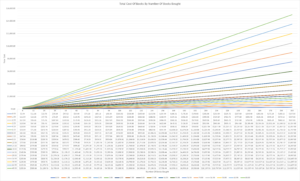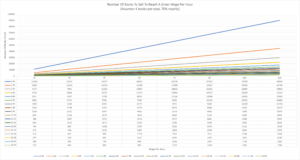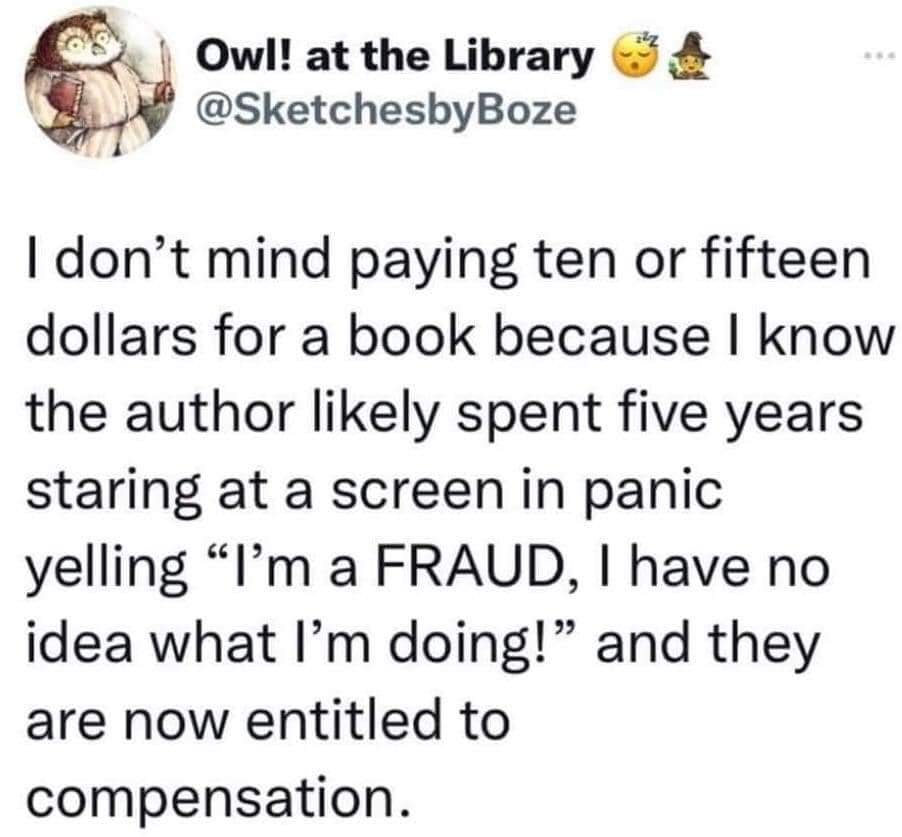If you’ve been on social media much in the last couple of weeks (and in various reading circles therein) in particular, you’ve probably seen the meme at the top of this post floating around.
Me being me, I decided to take a look at both of its claims – one, that a reader paying more for a book does anything overly beneficial for the author of that book and two, that the author will significantly benefit from a singular sale of a book.
The reason I wanted to look at these claims is because they directly speak to a couple of issues I’ve wanted to look at some hard numbers on almost since the beginning of this blog, and am only now actually sitting down to do, based on some Facebook comments I made about this very meme. Specifically, how the volume of books a reader reads directly impacts the price point they can reasonably afford per book (inversely) and just how critical word of mouth and reviews are for independent authors in particular in reaching any kind of livable income as an author.
First, let’s look at the total cost of acquiring new books based on how many books a reader is reading in a given period.

I’ll link the full Excel file at the end of this post, but here you can enlarge the image (full image is roughly 6000 x 2000 pixels) to see both the chart and the data it is based on. Basically, if you are a reader that only reads a couple of books per month, you can afford to pay up to $19.99 per book and spend less than $500 per year for your books. And looking out through the general population, there are in fact a LOT of people that fall into this 24-or-less-books-per-year category. According to at least some research, the average American is doing good to read even a single book per month, or just 12 books per year, a volume which can afford to pay up to $39.99 per book and stay under the (admittedly arbitrary) $500 mark. HOWEVER, followers of this blog will note that for the past couple of years, I’ve managed to top 250 books each year – and I’m currently on track to end 2022 somewhere near that number yet again. At this volume, paying even $1.99 per book crosses the $500/ year threshold – the same threshold that allowed someone reading 10% of my volume of books to spend 10x more money per book. Admittedly, during the time I’ve been at this volume of throughput I have also been *heavily* involved in reading Advanced Review Copies – ARCs – where I read the book in advance of public publication with the understanding that I will write a public review and spread it where possible. (Note that for various legal reasons, authors/ publishers cannot *require* this… but they also don’t have to offer the book to anyone or any particular person in ARC form either. 😉 ) Even then, I buy quite a few new books per year – either the books I’ve already read as ARCs (often, but not always) or books that just look interesting to me. Many of these wind up on my literally 5,000+ book and growing TBR list on my Kindle… but that is the subject of another post some day. 😀
The ultimate point here is that no matter your financial situation, the more you read, the more practical it is to find ways to lower your cost per book – *ethically*.
Let me be perfectly clear here: DO NOT STEAL BOOKS! DO NOT ACCEPT AN ARC AND THEN NOT REVIEW IT! DO NOT BUY A BOOK, READ IT, AND RETURN IT! Both of these are *STEALING* and directly impact an author’s ability to make a living as a writer – which we’ll get to in a moment.
If writing reviews is something you’re willing to do, perhaps look to sites like NetGalley or Edelweiss as a way to get into ARC work as a way to lower your cost per book. (There are also various Facebook groups for this that are recruiting at various times. Easiest way to find them is follow your favorite authors and watch for them to possibly mention recruiting for such a group – that is actually how I got involved with *everything*. :D) There are public libraries all across the US that allow you to borrow print or digital copies of books for free – many have even eliminated fines for returning books late, and there are at least some that will allow anyone who registers, no matter their geographic location (possibly just within the US?) to borrow digital books. There is Kindle Unlimited, which while not free allows for a bit of control of overall price per book if utilized heavily. There are sites such as BookBub that show you which books are on sale where and can even alert you when particular books or books from particular authors are on sale. There may be other ethically reasonable ways to reduce your overall price per book – if anyone has any suggestions I haven’t named here, please let me know either in the comment section here on the blog or on whatever social media platform you find this post!
Now, for authors… the obvious thing is that you want to make as much money as possible for your work – same as any of us in any other job. I totally get that, and I know phenomenal authors who have had to go back to working outside of writing in order to support their families due to lack of sales. I also know others who support not only their own families, but also sometimes a few entire families due to large backlists and presumably strong sales.
To get even a rough approximation of how many books an author needs to sell in a given period to make a range of wages, I made a few assumptions when building the chart here:
1) The author is independent, uses Kindle Direct Publishing, and chooses its 70% royalty option (which requires Amazon exclusivity and IIRC has price point minimums and maximums).
2) The author creates four books per year, is entirely responsible for all creation efforts (ie, doesn’t pay editors/ cover designers / etc), and does all production efforts from initial idea through publication in 13 weeks per book.
I know these aren’t completely realistic, as many authors pay not only editors and cover designers, but also personal assitants, perhaps blog tour / ARC organizers (placing a book on NetGalley on your own is *not* cheap!), and otherwise have other production-related expenses I either am not aware of or am not considering here. Obviously, all of these added expenses add to the number of books needed to be sold.
A final note before we see the chart: Note that this is *gross* income, as in, pre-tax. But here, I think that is fair as this is generally the way wages are discussed.
Here’s the chart:

Again, you’ll likely need to open it outside of seeing it in this post, as the overall image is again roughly 5000 x 3000 pixels, but does contain the graph-and-data structure from the reader chart.
Looking at this chart, let’s pay particular attention to the left 4 columns – $15/ hr through $60/ hr. $15/ hr is the “living wage” many are currently seeking as the Minimum Wage throughout the US. Over four books at this wage per hour, an author is looking at a total income for the year – again, pre-tax – of just $31,000. Which can be doable, if they live with someone who is earning at least as much and can share expenses. $60/ hr is fairly comfortably upper middle class, and assuming this can actually be achieved noting the realities above re: other expenses I haven’t accounted for in this basic analysis, could allow the author themselves to be the primary breadwinner in their family.
But now let’s look at the range of books one needs to sell in order to be within this wage range. At minimum, an author could sell just 223 books at $49.99 per book and hit the $15/ hr mark. Except that most books at that price point are highly technical and are essentially textbooks on some subject… which means there are likely a lot of added time and costs that are not reflected in my analysis here. At maximum, an author would need to sell just over 45,000 copies – of each of four books! – at a price point of $0.99 in order to make that $60/ hr wage.
And now we already see why reviews and word of mouth are just so critical to authors, and why paying more than you can afford just to seem “virtuous” or “helpful” is illogical.
Even if you spent $50 on that book and *loved* it – the author still needs to sell over 220 more copies of that book (again, plus three other books!) *just to make minimum wage*. If you are a more voracious and reasonably cost-conscious reader, that author needs to sell over 11,250 more copies of that book – plus the same number of three other books! – just to make minimum wage, assuming you paid $0.99 for your copy.
Ultimately, as many authors have said many times in many ways across all of social media and direct communication both personally and through groups / email lists/ etc, the singular best thing you can do to help an author whose work you enjoy isn’t to sacrifice your money – it is to sacrifice even a small segment of your own time. Write the review. Post it to at least Amazon (US is preferable, but even your own country’s Amazon variant is better than nothing at all), Goodreads, and Bookbub. (Also wherever you bought the book, assuming they have a place on their website to leave reviews.) It doesn’t have to be fancy or eloquent, it just has to be what you thought of the book – and about 24 words or so (to fulfill minimum word requirements on some websites). For reference, that last sentence was 25 words even before the parenthesis. Whatever social media platforms you use, mention the books and authors there too. If you’re in a conversation where it seems applicable – maybe they asked what you’ve been up to, or maybe the subject of the book id directly applicable to the conversation at hand – mention the book there too, no matter the environment. Ultimately, the goal is to put this author in front of as many potential buyers as you can. *That* is how you help them the most in reaching even that additional 11,250 readers beyond just yourself – even when your own circles aren’t anywhere near that big.
So go forth and review that book! 😀
References:
Click Here To Download The Excel File Discussed In This Post

